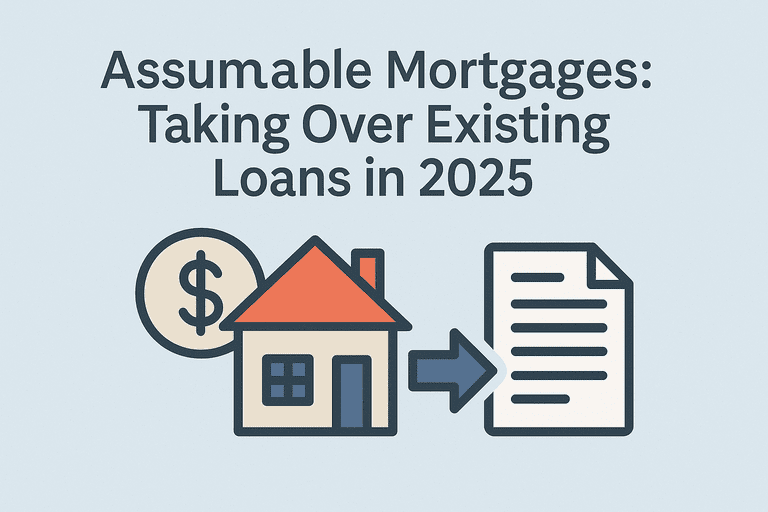Buying a home can be a complex process, especially with rising interest rates and strict lending requirements. However, some buyers can simplify the transaction and potentially save money through an assumable mortgage. By taking over an existing loan, homeowners can bypass certain qualification hurdles and lock in favorable interest rates.
What Is an Assumable Mortgage?
An assumable mortgage is a loan that allows a buyer to take over the seller’s existing mortgage rather than securing a new loan. Instead of the buyer obtaining a new mortgage with potentially higher interest rates or stricter lending standards, the buyer assumes responsibility for the current loan’s terms, including the interest rate, remaining balance, and repayment schedule.
Loan assumption can be particularly advantageous in a rising-rate environment, where assuming an older, lower-interest mortgage can result in significant savings over time.
Types of Assumable Mortgages
Not all loans are assumable. The two main types are:
1. FHA and VA Loans
Federal Housing Administration (FHA) and Veterans Affairs (VA) loans are commonly assumable. They often allow qualified buyers to take over the existing mortgage with minimal restrictions, preserving the loan’s original favorable terms.
2. Conventional Loans
Most conventional loans are not assumable, unless explicitly stated in the mortgage contract. Buyers interested in assuming a conventional loan must verify the lender’s policy and meet any credit and income requirements.
Benefits of Assumable Mortgages
Assuming a loan can offer multiple advantages:
1. Lower Interest Rates
If the existing mortgage has a lower interest rate than current market rates, the buyer can save significantly over the life of the loan.
2. Reduced Closing Costs
Assumable mortgages often require fewer fees and lower closing costs compared to originating a new loan.
3. Faster Loan Approval
Since the loan already exists, the approval process may be quicker, though lenders may still require credit and income verification.
4. Simplified Home Purchase
Loan assumption can make the transaction smoother, particularly for buyers with strong financials who qualify for the assumption.
Considerations and Risks
While there are benefits, buyers should also consider potential drawbacks:
Due-on-Sale Clause – Some mortgages include a clause allowing the lender to demand full repayment if the property is sold. Always confirm the loan is assumable.
Equity Payment – Buyers may need to pay the seller the difference between the home’s sale price and the remaining mortgage balance.
Qualification Requirements – Lenders may require the assuming buyer to meet credit and income standards.
Limited Availability – Not all loans are assumable, and not all sellers will offer this option.
How to Assume a Mortgage
Here’s a step-by-step overview:
Confirm Loan Assumability – Check the existing mortgage contract and speak with the lender.
Evaluate Financial Feasibility – Determine whether assuming the loan saves money compared to obtaining a new mortgage.
Negotiate with the Seller – Agree on the purchase price and any equity payment required.
Submit Application to Lender – Provide financial documents, undergo credit checks, and satisfy lender requirements.
Finalize Transfer – Complete the paperwork to officially transfer the mortgage to your name.
Assumable Mortgages vs. New Loans
| Feature | Assumable Mortgage | New Mortgage |
|---|---|---|
| Interest Rate | Often lower than current market | Set by current rates |
| Closing Costs | Typically lower | Standard fees apply |
| Loan Approval | May be quicker | Full underwriting required |
| Flexibility | Limited to existing terms | Full customization |
Who Should Consider Assuming a Mortgage?
Homebuyers Seeking Lower Rates – Lock in an existing low-interest loan in a rising-rate market.
Investors – Simplify financing for rental or investment properties.
Buyers with Good Credit – Easily meet lender qualification requirements for assumption.
Sellers Offering Favorable Terms – Can attract buyers by providing an assumable mortgage.
Conclusion
Assumable mortgages can be a powerful tool in 2025 for buyers looking to save money and simplify home financing. By understanding loan assumptions, eligibility requirements, and potential risks, homebuyers can make informed decisions and secure favorable financing without the hurdles of a new mortgage.
For more insights, mortgage calculators, and loan comparisons, visit CalculatingAMortgageLoan.com.
Sources:
